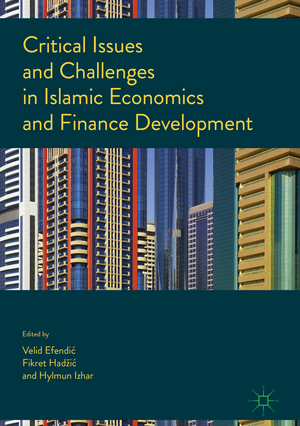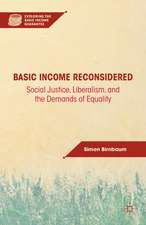Critical Issues and Challenges in Islamic Economics and Finance Development
Editat de Velid Efendić, Fikret Hadžić, Hylmun Izharen Limba Engleză Hardback – 12 mai 2017
| Toate formatele și edițiile | Preț | Express |
|---|---|---|
| Paperback (1) | 777.35 lei 43-57 zile | |
| Springer International Publishing – 28 iul 2018 | 777.35 lei 43-57 zile | |
| Hardback (1) | 782.42 lei 43-57 zile | |
| Springer International Publishing – 12 mai 2017 | 782.42 lei 43-57 zile |
Preț: 782.42 lei
Preț vechi: 954.17 lei
-18% Nou
Puncte Express: 1174
Preț estimativ în valută:
149.73€ • 155.37$ • 125.15£
149.73€ • 155.37$ • 125.15£
Carte tipărită la comandă
Livrare economică 17-31 martie
Preluare comenzi: 021 569.72.76
Specificații
ISBN-13: 9783319450285
ISBN-10: 331945028X
Pagini: 224
Ilustrații: XVI, 236 p. 49 illus.
Dimensiuni: 148 x 210 x 22 mm
Greutate: 0.45 kg
Ediția:1st ed. 2017
Editura: Springer International Publishing
Colecția Palgrave Macmillan
Locul publicării:Cham, Switzerland
ISBN-10: 331945028X
Pagini: 224
Ilustrații: XVI, 236 p. 49 illus.
Dimensiuni: 148 x 210 x 22 mm
Greutate: 0.45 kg
Ediția:1st ed. 2017
Editura: Springer International Publishing
Colecția Palgrave Macmillan
Locul publicării:Cham, Switzerland
Cuprins
Chapter 1) How Does Sovereign Sukuk Impact on the Economic Development of Developing Countries?: An Analysis of the Infrastructure Sector; Ahlidin Malikov.- Chapter 2) No Way Out for Sukuk Illiquidity?: Proposing Primary Dealer System for Sukuk Market; Ilham Reza Ferdian and Miranti Kartika Dewi.- Chapter 3) Possibility of Early Warning Signs (EWS) Application into the Quality management System of Credit Portfolio of Islamic Banks; Fikret Hadžić and Amir Softić.- Chapter 4) A look to the Cash Waqfs as Islamic Financial Institutions and Instruments; Mehmet Bulut and Cem Korkut.- Chapter 5)The Implementation of Islamic Financial Services in Afghanistan – A Case; Natalie Schoon.- Chapter 6) All Weather Financial Portfolio Optimization With Islamic Constraints And Risk Minimization; Migdat I. Hodžić, Zlatko Dž. Sijerčić and Tarek Names.- Chapter 7) The Usefulness of Financial Ratios in Discriminating Between Healthy and Distressed Companies: a Case of anIslamic Bank; Nerma Saračević and Nataša Šarlija.- Chapter 8) Empowerment of Women in Islamic Economies – the Bosnia and Herzegovina Experience with a Focus on Business Problems in a Women’s Small Entrepreneurship; Munira Šestić and Sabina Ibrahimagić.- Chapter 9) Business Model and Operational Efficiency of Microfinance in Bosnia and Herzegovina – Lessons for Islamic Microfinance; Velid Efendić and Fikret Hadžić.- Chapter 10) A Brief Analysis of the Expected and Non-Expected Outcomes from the Application of Rome I Regulation in the European Zone in Light of Islamic Cross Border Transactions; Sultan Abdulsalam.
Notă biografică
Velid Efendić is a professor in the faculty of economics at the School of Business and Economics at the University of Sarajevo, Bosnia and Herzegovina. His research interests include banking, bank management, Islamic banking and finance and investment and portfolio management. Professor Efendić is the founder of the European Association of Islamic Economics, Banking and Finance, Bosnia and Herzegovina.
Fikret Hadžić is a professor in the faculty of economics at the University of Sarajevo, Bosnia and Herzegovina. He was previously the Vice-Director of The Bank of Reconstruction and Development, Sarajevo, Bosnia and Herzegovina. Professor Hadžić also serves on the Supervisory Board of the Development Bank of the Federation of BH, Sarajevo, by appointment of the Federal Government of Bosnia Herzegovina.
Hylmun Izhar is an economist at the Islamic Research and Training Institute at the Islamic Development Bank in Jeddah, Saudi Arabia. His current research interests include the theoretical and empirical analysis of income ratio and risk-sharing structures, the development of global Islamic financial services and stress-testing within Islamic financial institutions.
Textul de pe ultima copertă
This book explores contemporary issues and trends facing Islamic banks, businesses and economies as presented at the International Conference of Islamic Economics, Banking and Finance. The authors leverage current empirical research and statistics to provide unique and fresh perspectives on the changing world of Islamic finance. They focus specifically on to the implementation of Islamic financial instruments and services in global capital markets and how their success can be evaluated. Chapters feature case studies from all over the world including examples from Afghanistan, Bosnia and Herzegovina and the United Kingdom, to name a few. The breadth and immediacy of the research presented by the authors will appeal to practitioners and scholars alike. The global outlook and rich data-based approach adopted in this book guarantee that it is a timely and valuable addition to the field of Islamic finance.
Caracteristici
Presents original and current empirical research into emerging trends and issues impacting Islamic finance Offers a global perspective on problems faced by Islamic financial institutions and economies Features insight from notable scholars in the field of academic Islamic finance Explores the cultural and socio-political factors impacting Islamic banking and financial operations















